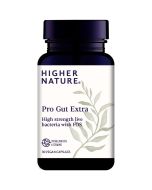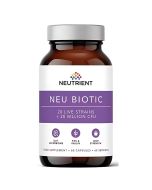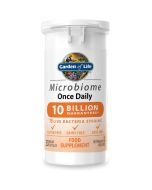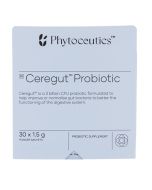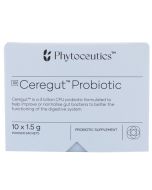
Probiotics & Digestive Enzymes: Differences & Supplement Uses
By Girish Desai, Pharmacist
Both probiotics and digestive enzymes are important for gastrointestinal health and support. The gut environment is most commonly damaged by the use of antibiotics or a poorly balanced diet, and these are the most common times when probiotics, digestive aids or their supplements will be recommended.
But, with the huge number of probiotic and digestive enzyme products on the market, combined with strict laws about what manufacturers put on their labels, it can be confusing to figure out the differences between them. Here, we want to make it a bit clearer by explaining what probiotics and digestive enzymes are, plus when and why you might need to take their supplement form and which variety may be best suited to your needs.
What's The Difference Between Probiotics And Digestive Enzymes?
Probiotics improve the overall health of the gut, while digestive enzymes make digestion more comfortable. The key difference is that probiotics are essentially 'friendly gut bacteria' that help to maintain healthy gut processes. Digestive enzymes help specifically with digestion, facilitating the breakdown of nutrients into a form that allows them to be absorbed into the body. They perform different, but complementary, functions.
We are still learning about what probiotics and digestive enzymes really do in the body, especially when it comes to the types of each. But we do know quite a bit already.
What Are Probiotics?
Probiotics are bacteria and yeasts which are considered good. Everyone’s gut contains both good and bad bacteria. Probiotics are often considered helpful bacteria because they support your body, in particular the digestive system. They help maintain a healthy gut – which you probably know from many a yogurt brand advert or slogan, and it's true!
There are two main types of probiotic:
- Bifidobacterium – this is found in dairy products, such as milk, cheese and yogurt
- Lactobacillus – the more common of the two core probiotics, it is found in yogurt and fermented foods
Probiotic Foods

The most common probiotic foods include:
- yogurt
- pickles
- kombucha
- miso
- tempeh
- sourdough
- some cheeses – such as: gouda, traditional cheddars and Gruyère
As well as those, some of the fermented foods that are a good source of probiotics are also great sources of digestive enzymes, namely:
- kefir
- sauerkraut
- kimchi
When & Why You Might Need Probiotic Supplements
When your gut is unbalanced, you can end up with minor or major gut problems. Lactobacillus and bifidobacterium can help to treat different digestive issues.
There are four main digestive disorders which probiotics can help with, they are:
- Irritable bowel syndrome (IBS) – a common, long-term digestive condition, symptoms include stomach cramps, bloating and more. Based on the most recent studies, the best probiotic for dealing with this has been bifidobacterium.
- Inflammatory bowel disease (IBD) – this is an umbrella term for a few disorders which involve the chronic inflammation of the digestive tract. Depending on your personal gut health, certain probiotics can help to prevent or minimise intestinal inflammation.
- Gastroenteritis (aka Infectious diarrhea) – caused by bacteria, viruses or parasites, the probiotic lactobacillus is considered best for assisting with relief from the symptoms, which can include diarrhoea, vomiting and abdominal pain.
- Diarrhea caused by antibiotics – Medication can cause a change in the makeup of your intestinal bacteria, leading to digestive issues. While symptoms should dissipate once you have completed your regimen, if you are on antibiotics for a prolonged period of time, lactobacillus or saccharomyces (another, less common probiotic) have been found to help alleviate symptoms.
If you aren't able to eat probiotic rich foods, such as dairy, or don't have access to them, then you may want to consider a probiotic supplement. It is advised when considering taking any supplement that you speak to your GP to see what they recommend.
What Are Digestive Enzymes?
Digestive enzymes are proteins. They speed up the chemical reactions that turn what we consume into substances that can be absorbed by the digestive tract. They are key to ensuring we turn what we eat and drink into a useful substance that supports the body.
There are three main types of digestive enzymes, which digest different nutrients:
- Amylase – Allows for the breakdown of carbohydrates and starches
- Protease – Enables the digestion of proteins
- Lipase – Takes apart fats for use in the body
Sources Of Digestive Enzymes

The gut is full of all kinds of bacteria and enzymes, but where do they come from? They often come from the food we eat. There are certain foods that are great sources of digestive enzymes and each contains certain varieties.
- Honey – In particular, raw honey is a good source of amylase and protease
- Fruit – There are a number of tropical fruits that contain digestive enzymes, such as:
- Mangoes and bananas – which have amylase
- Pineapples – which contain bromelain
- Papaya – contains papain, a type of protease
- Avocados – contain lipase
- Fermented foods – Through the fermentation process, these foods contain valuable digestive enzymes. For example:
- Kimchi – contains bacteria that produces amylase, lipase and protease
- Sauerkraut – contains sulforaphane which allows for a range of digestive enzymes
- Kefir – contains lipase, lactase and protease
When & Why You Might Need Digestive Enzyme Supplements
If your body doesn't produce enough digestive enzymes, it can't digest food, leading you to experience stomach aches, gas or diarrhea or other pains in the region of your gut. You might not have enough digestive enzymes because of a digestive disorder, such as:
- Lactose intolerance – 65% of the world's population has a lactose intolerance, meaning there are a lot of people for whom the enzyme lactase is not being produced enough to break down the sugar in dairy, like milk and cheese. With lactose intolerance, dairy isn't broken down and travels on to meet with bacteria in the colon, which causes issues.
- Exocrine pancreatic insufficiency (EPI) – People who have cystic fibrosis and Shwachman–Diamond syndrome will also likely have EPI. They lack the digestive enzymes produced by the pancreas and so are unable to digest food.
If you have a condition that affects your body's ability to create digestive enzymes, then you will need to speak to your GP about taking digestive aids/digestive enzyme supplements.
Disclaimer
The products offered are not intended to diagnose, treat, cure, or prevent any illness or disease, or to replace the advice of a medical professional. Results are not guaranteed and may vary from individual to individual.

